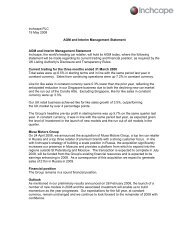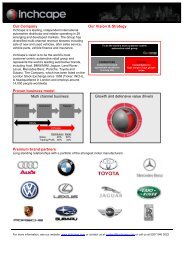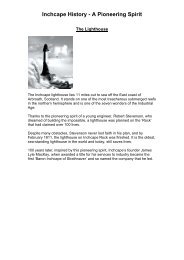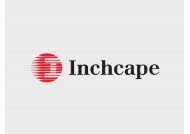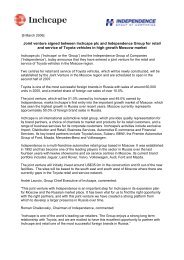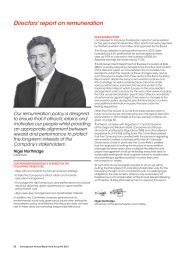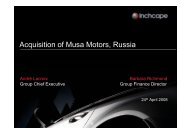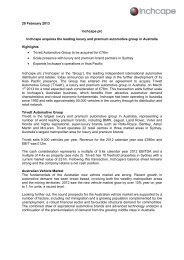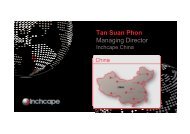Full Annual Report - Inchcape
Full Annual Report - Inchcape
Full Annual Report - Inchcape
You also want an ePaper? Increase the reach of your titles
YUMPU automatically turns print PDFs into web optimized ePapers that Google loves.
Section Two<br />
Two<br />
Governance<br />
iPOM – 7 Key steps<br />
Step<br />
1 Written<br />
compliance<br />
standards and<br />
procedures<br />
2 Oversight<br />
responsibilities<br />
assigned to<br />
appropriate<br />
personnel<br />
3 Appropriate<br />
delegation<br />
of authority<br />
4 Training and<br />
education<br />
5 Routine<br />
monitoring,<br />
reporting<br />
and auditing<br />
6 Enforcement<br />
and discipline<br />
7 Response<br />
and prevention<br />
Purpose<br />
What are the rules<br />
Who is in charge<br />
What employee education is in place<br />
regarding the rules and standards<br />
How do we know the rules are<br />
being followed<br />
What happens if the rules and<br />
standards are not being followed<br />
Examples of key projects for 2009, including key initiatives that were<br />
either introduced or reinforced were:<br />
• compliance certificates signed by all Managing Directors and<br />
Finance Directors as part of the year end process confirming<br />
that all key controls had been complied with and there were no<br />
outstanding issues to be resolved.<br />
• the Group Risk Register process continued, with a bottom up top<br />
down approach used to identify the key Group and market risks<br />
and to look at the impact of mitigating actions that had been<br />
implemented.The Business Risk Assessment forms part of the<br />
scheduled <strong>Annual</strong> Operating Plan process and monthly market<br />
review meetings as well as being a key agenda item for review<br />
at the RMSG and Audit Committee meetings;<br />
• a Group Subsidiary Governance Manual was rolled out to all<br />
markets in 2009.This sets out the policies that all operations<br />
within the Group are required to comply with, covering a number<br />
of areas including tax, treasury, finance, legal, company<br />
secretariat and HR.<br />
The RMSG is supported by market risk committees that share<br />
the common risk agenda, and which report to the RMSG on<br />
a regular basis.<br />
Control procedures and monitoring systems<br />
A Group Risk Register,which identifies the key risks,the impact should<br />
they occur and actions being taken to manage these risks at the<br />
desired level, is produced for each business unit. In addition, actions<br />
to be taken in the event that such risks crystallise and proposed<br />
improvements to the way they are managed are also included.<br />
The Group Risk Register is approved by the RMSG and the Executive<br />
Committee and discussed by the Audit Committee at its meetings.<br />
The Group also monitors its control procedures in the following<br />
key areas:<br />
Financial reporting<br />
There is a comprehensive system with an annual budget approved<br />
by Directors. Monthly actual results are reviewed and reported<br />
against budget and, where appropriate, revised forecasts are<br />
presented at Board meetings.<br />
Investment appraisal<br />
The Group has clearly defined policies for capital expenditure.<br />
These include annual budgets and detailed appraisal and<br />
review procedures.<br />
Internal Audit<br />
The adequacy and effectiveness of the Group’s internal control<br />
systems are monitored by the Internal Audit team who report to the<br />
Audit Committee on a regular basis. Internal Audit also works closely<br />
with management and the external auditors.<br />
Business Unit Controls<br />
Each business in the Group is required to identify its key risks and the<br />
control procedures in place to mitigate those risks.This evaluation<br />
takes place twice a year as part of the preparation and update of<br />
the business plans.<br />
During 2009, the Managing Director and Finance Director of each<br />
business unit in the Group signed a compliance certificate to<br />
confirm:<br />
• the accuracy and completeness of the accounts submitted<br />
for consolidation;<br />
• compliance with local laws and regulations;<br />
• the absence of fraud;<br />
• the absence of conflicted directorships; and<br />
• compliance with <strong>Inchcape</strong> policies.<br />
www.inchcape.com 61



